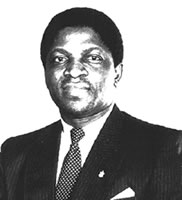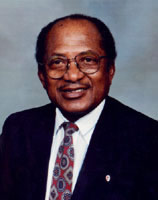
Former Vice Presidents Bishop Bennie Warner, Dr. Harry Moniba, Others React to the Postponement of 2005 Elections in Liberia
By Winsley S. Nanka
Wnanka@theperspective.org
The Perspective
Atlanta, Georgia
September 2, 2004
 |
|
Dr. Harry Moniba
|
 |
| Bishop Bennie D. Warner |
Bishop Bennie D. Warner, former Vice President of the Republic of Liberia and lecturer Oklahoma City University school of Divinity: I do not favor postponing the October 2005 national elections in Liberia because of decentralization. Decentralization and the October 2005 national elections are two different issues. The issue of decentralization is not new in Liberia. In 1980, three months before the coup that overthrew the William R. Tolbert government, the Rural Development Task Force I headed in conjunction with the United Nations Development Program submitted its report on government restructuring to the Liberian government. The report called for the decentralization of the Liberian government. The task force findings included the election of superintendents, revenue sharing and streamlining of government functionaries, among others.
The creation of the task force came about because of the duplication and overlapping of functions within the Liberian government bureaucracy. Most of the county superintendents at the time recommended decentralization because of the difficulties they faced in getting resources for development from the central government in Monrovia. I recommend that a commission be established to put a decentralization program in motion in Liberia. The commission may use the 1980 Rural Development Task Force Report, relevant literature on decentralization, and participation from the Liberian people to design a decentralization program for Liberia.
Dr. Harry F. Moniba, Former Vice President of the Republic of Liberia: I do not believe Liberians should postpone the elections in October 2005. The arrangement that brought the current interim government to power was put together by the international community with the understanding the term of the interim government will come to an end after the October 2005 elections. While we have the support of the international community, we should go ahead with the elections as planned. Since 1990, Liberia has had series of governments not based on the constitution. Importantly, if the elections are postponed, who will bear the financial and security responsibilities for Liberia? If Dr. Amos Sawyer believes Liberia should decentralize, why he did not go to Ghana to try and make his decentralization proposal part of the comprehensive peace agreement? I believe in limited decentralization including the election of superintendents, etc. I also believe that the issue of decentralization needs to be handled by an elected government to have legitimacy. The current interim government does not have the legitimacy to advance constitutional reforms.
All Patriotic Liberians need to be concerned about resettlement, disarmament, shelter for our people and the provision of other basic services in Liberia. How can we talk about decentralization in the face of the social and economic dislocation in Liberia?
Dr. Abraham James, Political Scientist and Constitutional Lawyer: I have deep interest in decentralization of government authority in Liberia. However, I do not believe postponing the 2005 national elections will be able to accomplish the constitutional changes necessary to bring it about. The issue (decentralization) should be sufficiently discussed and a commitment from all the presidential candidates that whoever wins would implement decentralization. The Liberian constitution clearly states how the document can be changed, i.e. through the amendment process. However, if Liberians want to change the constitution through a referendum process, the provision that relates to the amendment process has to be suspended.
Arabella Greaves, Former Assistant Minister, Planning, Research and Development, Ministry of Health and former Technical Officer, World Health Organization (posted to Zimbabwe): I support decentralization, given my experience in the health services sector in Liberia. However, I do not believe postponing the elections in Liberia would serve that purpose. I propose that a standing commission should be established to devise a decentralization program for Liberia with the input of the Liberian people. The standing commission should extend between five to ten years. Its responsibilities among others, would be to make sure the “decentralization structure becomes functional”. The standing commission should report to the national legislature yearly. Secondly, if a standing commission is not established, the Ellen Johnson-Serleaf Good Governance Reform Commission could be expanded to meet the decentralization objective. However, for any decentralization program to succeed it would require massive civic education, Liberians have to know their rights and responsibilities.
Cllr. Ambrose Taplah, Former Assistant Legal Manager, Central Bank of Liberia and LLM candidate, Corporate Law, Widener University: In general Liberia does not need a decentralization program. The problem in Liberia is mainly due to the failure of the legislative branch to exercise its constitutional responsibilities. I am in favor of postponing the 2005 national elections in Liberia. Not on account of decentralization, but to allow for complete disarmament, resettlement, a national census and the creation of an environment that would sustain democracy in Liberia.
Victoria K. Bernard, former Health Information Officer, Ministry of Health: I really do not think it makes a lot of difference if the elections are postponed for a year. The architects of the decentralization program need to submit their proposal to the international community to determine if they have the willingness to commit to Liberia for another year. If not, then the elections should go ahead. However, the Liberians need to seek commitment from the elected government that it would implement decentralization.
Judson Addy, Economist and former assistant professor, University of Liberia: If the national elections are postponed, several issues have to be considered, (a) the current interim government has to leave power and a new leadership that has the willingness and understanding of good governance installed for a limited period; (b) There must be no warlords or their surrogates in the interim government.
Given Liberians' reactions, it seems that Liberians are prepared to decentralize governance in Liberia, but not at the expense of the 2005 national elections. Dr. Amos Sawyer, Yarsuo Weh-Dorliae and others have to convince the Liberian people and the international community that it is in the strategic interest of Liberia to postpone the 2005 national elections. In addition, persistent reports of indiscriminate spending by the Gyude interim government would make it difficult for Liberians and the international community to postpone the elections in Liberia.

